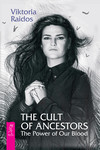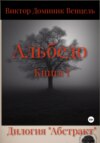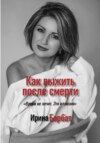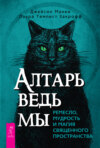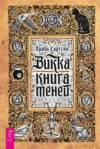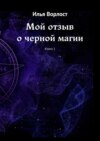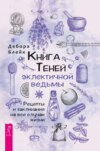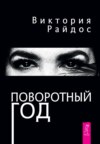Buch lesen: «The Cult of Ancestors. The Power of Our Blood»
Raidos Viktoria
THE CULT OF ANCESTORS. The Power of Our Blood
Translation by Benjamin Hugh De Courcy Jones
© OJSC Ves Publishing Group, 2017
Дорогой читатель

Искренне признателен, что Вы взяли в руки книгу нашего издательства.
Наш замечательный коллектив с большим вниманием выбирает и готовит рукописи. Они вдохновляют человека на заботливое отношение к своей жизни, жизни близких и нашей любимой Родины. Наша духовная культура берёт начало в глубине тысячелетий. Её основа – свобода, любовь и сострадание. Суровые климатические условия и большие пространства России рождают смелых людей с чуткой душой – это идеал русского человека. Будем рады, если наши книги помогут Вам стать таким человеком и укрепят Ваши добродетели.
Мы верим, что духовное стремление является прочным основанием для полноценной жизни и способно проявиться в любой области человеческой деятельности. Это может быть семья и воспитание детей, наука и культура, искусство и религиозная деятельность, предпринимательство и государственное управление. Возрождайте свет души в себе, поддерживайте его в других. Именно это усилие создаёт новые возможности, вдохновляет нас на заботу о ближних, способствуют росту как личного, так и общественного благополучия.
Искренне Ваш,Владелец Издательской группы «Весь»Пётр Лисовский

Introduction


Ghosts come to me.
That is just what I do – I see them and hear them.
But they also come to each of you. There is not one person to whom this has not happened, considering all our dearly departed are in fact with us nearby. They might even be here with you now as you read these lines.
My job is to see them and hear them and, as their trusted person, to pass on to people what they want to say. Remember that these ghosts were once living people, parts of whom you are carrying around in your genes – your ancestors.
And they need one thing, which only the living can give them – memory.
“Can give” and, really, must give.
Memory is even a mark of respect that we all should give to those who brought us into this life.
Those who gave us our character traits, talents, patterns of behaviour, complexion, eye color, and hair.
In many ways – our fate.
They are nearby in order to give us strength. Teach us to overcome difficulties, save us from mistakes, help us to achieve what we – and they – want.
What happens when we push away their help? When we do not think that there were millions of years of successive lives and loves of these people who led to our appearance into the world?
In a case when descendents cannot draw strength and experience from previous generations, they have no strength left for carrying on the family line. This can happen for various reasons. Sometimes a person can start considering themselves more successful, smarter and more educated than his ‘illiterate’ ancestors. Sometimes ancestors are forgotten as the result of revolutions, civil wars or catastrophes. Sometimes it might even be frightful to have an ‘undesirable’ relative or ancestor. So they get forgotten, or – to be more precise – disowned.
Disowning one’s roots is the most harmful thing a living being can do.
What happens if one disowns half (a quarter, an eighth, or even all) of one’s genes?
Imagine a tree that rejects its roots!
This is a common problem for modern civilisation. Taking the side of material possessions, pleasures and joy, people turn their backs on their history, in other words – on themselves, creating a great thirst in their souls. A thirst for AUTHENTICITY, a thirst for confidence and the righteousness of their present and future lives – their own and their children’s that can only be based on solid foundations.
We try to quench this thirst with countless adventures, travels, exotic cultures, other worlds, strange and fascinating fates, passions, fashions and ‘spiritualities’.
But to nourish a living being can we really substitute simple, real water for anything else?
When strength, flowing for millions of years from ancestor to descendent, becomes unclaimed or meets an obstacle, it is like a dam in a river. There is as much water as you need, but you feel like you are in a desert. Your garden that you have been cultivating while neglecting yourself, dries out. And if the water pressure becomes too high that the dam breaks, the torrent will be so strong that you will most probably drown.
This thirst of the modern human can only be quenched by a mother’s milk, a father’s guidance, a grandmother’s blessing and a grandfather’s advice.
By the force that comes from the soil, through the roots.
This is the knowledge, intuitively known to all living creatures, that ‘homo sapiens’ dares to ignore.
Knowing this tribal system, how a person can draw energy from their family and how to act correctly so this bloodline link does not break – but rather strengthens – with time, is useful to anyone.
Because the bloodline can give not only a strong family and good children, but a career, money, social status and successful self-fulfilment.
Or the other way around – the family line can take away and destroy, make one repeat the mistakes of one’s ancestors or pay for their debts. It is often hard to abstain from something that has been forced onto you by the blood of your ancestors – especially when you do not even realize what is happening. Frequently, it is actions that are difficult to explain with common sense that are easily explained by problems that you have to solve as the inheritor of a particular bloodline. This task, of course, becomes more difficult – or even impossible – if its preconditions are not understood. If negative information encoded into the family line does not get reprogrammed, it will affect all of the upcoming generations. There is always something that was just ‘written into one’s family line’, but in every family line there is always the first one.
A family line, like every living thing on Earth, should change and transform to stay alive. And these changes should benefit the members of a given family line. Conditions under which a person exists are heavily dependent on the actions of his ancestors. But how you act, which life choices you make and in which direction you take your family line depends entirely on you.
In any political regime, any economic situation and cultural environment there is one solid, unchanging truth – you are someone’s descendant. And someone’s ancestor.
Ask yourself – What kind of ancestor will I be for my descendants? Are you going to be the one whom they will try to forget, considered to be the reason for all the misfortunes in the family? Or will you be the one whom everyone will thank and be proud of, whose actions they will carry on? To whom your grandchildren and great-grandchildren will want to be similar? In which conditions will those who come after you find themselves?
But to change the course of fate you need a lot of strength. And also a lot of understanding and compassion.
Human life and fate itself – the relationships we have with others, work, wealth, health, – is all closely connected to that almost ephemeral state that we call ‘psychology’. And psychology itself is tightly connected to family (upbringing) and the whole bloodline system (genes).
It is not by chance that many psychological movements of the twentieth century (for example, psychoanalysis, systemic family constellations and psychogenealogy) are based on connections of an individual with their whole family and ancestors, with many modern psychological techniques being closely related to shamanic practices. With all our beliefs in scientific research and evidence, modern humans cannot completely abandon the traditions refined by generations, so that one’s life and the lives of one’s children are not distorted or disharmonized.
In this book there will be a lot of references to folk customs and various traditional cultures. This not only pays respect to the cultures of past generations, it is also an effective tool. I tend to trust experience that is many thousands of years old. A human in tradition is a human in harmony with the universe, with nature and all of existence, capable of absorbing energy from the world around, as well as from within.
People who have kept their connection with nature (as well as with their own nature) also maintain a connection with strength. Traditionally, all individuals were in regular contact with the sacral, turning to their ancestor’s spirits and holding ceremonies to influence their present realities.
To understand the mechanism of how the family line influences humans is important for everyone, especially those who have any ambitions and abilities with magic. In shamanic traditions, the first thing you must do is to make amends with your ancestors’ spirits, because they become a conductor to the spiritual world in general. It is also better to get familiarized with the whole system of how energy circulates among humans and how the forces of life and death operate with something that you can observe closely – your own family line. This is especially important in the modern world where the inheritance of magical traditions in many cases has been interrupted and a whole host of various and often contradictory traditions prevail. In this case, great individual power combined with ignorance can lead to serious mistakes that are harmful, not only to the individual but also to his descendants.
My name is Victoria Raidos, and I am a Priestess of the Cult of Ancestors.
I cannot transmit to everyone on Earth what their ancestors want to specifically tell them.
But I can transmit to everyone what our ancestors want to tell all of us, through this book. I can remind people what they often forget, that humans always have enough strength to solve any problem – even the scariest and seemingly unsolvable. All we need to know is how to find that strength and where to draw it up.
Real strength can only be found within. You really must value this magical power that you already have and carry inside you.
Your power is in your blood.
Blood that you got from your ancestors.
The Power of Blood

In this chapter I will explain what the Cult of Ancestors is, why it is needed and how to observe it.
I will recount how rituals of commemoration were held in the past and how they should be carried out today.
This is the longest, most complex and most important chapter of the book.


We all want to live our lives meaningfully and happily. As the old proverb goes: ‘Every man should build a house, plant a tree and raise a son’. Become a respected person. Realize our potential and talents. Achieve our dreams. Each of us has enough energy to make all of this happen and to live a life that we want.
If a person feels that they lack energy, it normally means that they do not know how to use it. Most of this energy we can get from our bloodline. If many people in the family lived their lives reasonably and with content, there is no bad heredity. These kinds of families can be considered as the most respected, because it gives its descendants all the power that has been stored there for centuries. If you are lucky to be born into such a family – use this gift wisely! Remember that you hold a great power that you need to cultivate and continue.
But what if a family is weak? This happens when there are suicides, unborn children, abandoned family members and curses in the family. These do not give an individual any power, but take it away. Often, in this case, an individual seems unable to start living their own life and inevitably and constantly works on solving problems from the family line.
Often these bloodline problems lead to complications that seem to appear out of nowhere that a person is not able to solve: lack of happiness in one’s life, suicidal thoughts, physical or psychological diseases, complications in creating their own families (unrequited love, problems with a spouse and children or infertility). And if an individual is doing everything correctly but life still just does not come together, then it is a sign of the problems being a part of an entire family line.
So what to do? Complain about how unfair destiny is that led to this particular person to be born in this particular family?
Every individual has their own life path and a goal that he or she should achieve. And all of us have conditions in which we find ourselves as we move along this path. This can be imagined as weights on one’s legs: you have a task that you are performing but at the same time you are not entirely free, with the weights providing added complications. But even in sport, weights are not given for nothing. It is done to achieve better results, to work out some specific muscles, for example.
The same happens with fate. Our very first reaction to anything difficult is, of course, annoyance. This is so unfair! Why am I the one to have to go through this, to be born into a family where there are so many problems? A family where a genetic disease is inherited, where every other person is an alcoholic or where relatives were tortured and slaughtered? Don’t I have an individual mission on this planet besides working through the problems of my ancestors that they most often created themselves?
There are individuals whose spiritual level is high enough to understand that what is happening is no accident. They see the complicated conditions into which they were born not as sad coincidences, but conditions necessary for their personal growth and the fulfillment of their destiny.
The universe makes no mistakes when it creates the very specific conditions into which each of us are born. Everybody has a time when the universe checks how well this person has learnt their life lessons. These are the trials that an individual needs to go through to reach a new level or to confirm being on the level that they deserve. One of these trials can be working through family karma. Maybe in one of your previous incarnations you created this karmic knot yourself, leading to these present family complications. Your task is then to work on your mistake, resolving it or being punished by it. It is very complicated – almost impossible – to step out of this family programming by just wishing it. You can only cure the problems. And there was always someone who was the first one to do something for the first time.
So it might be you, the first ‘strong one’ in your family line who will change the whole family line for the better?
The Cult 0f Ancestors

The Cult of Ancestors forms the foundation of all religions and spiritual teachings. It could even be considered as a ‘family religion’ because it is the veneration of deceased ancestors of one particular family. The spirits of a family are the inhabitants of another world who, by default, are friendly towards their descendants and are ready to assist them. As the main protectors of the family, they are able to give their living relatives help and protection with all the power that spirits possess. The main thing here is to be able to accept this help. And this is exactly what one learns by carrying out rituals of venerating ancestors – the correct behaviours and attitudes towards one’s family line.
The cult of venerating ancestors is a whole worldview in which an individual is part of a harmonious world system and part of nature. This knowledge would keep us from making many mistakes and give us much value.
A great importance of ancestors can be understood just from some knowledge of biology. Our ancestors are present – or, it could be said, resurrected – in us as genes. We are made from their flesh and blood. Everything experienced by them – actions, sensations, thoughts – comes to us and then to our children. And we should pay our respects to our ancestors for at least surviving and giving us the gift of life. If it were not for them, there would be no us.
A human is not only a biological creature. People rely not only on their instincts, but also place great significance on culture, which is the main system through which we transfer our experience to our descendants. This exists on a level of universal human culture, as well as on the levels of one individual and those close to them. The culture of venerating ancestors is something that connects people. Despite any one belief system, you are someone’s descendant, and – if you are lucky – someone’s ancestor.
How do dead ancestors help their living relatives? At the moment, there is no scientifically proven explanation of the workings of the Cult of Ancestors.
We can only use it as a practical tool to get results, but not fully understanding exactly how it functions. Whether this informational and energetic connection is created through a genetic code or any other way, we simply do not know anything specific so far.
The same occurs not only in the esoteric, but in another science that studies the human soul, psyche and behaviour – psychology. The method of ‘systemic family constellations’, for example, is a psychological principle that was discovered at the end of the twentieth century by Bert Hellinger. In this method, the history of a client’s family is described as a system that works according to particular laws. The constellation itself happens in a group with random people unrelated to the client acting as the client and their family members. Yet during the session they unwillingly start acting and thinking as the person whom they are representing. This way, the client gets information about his family and understands the roots of his problems, and so can influence it. But the way this knowledge is accessed cannot be explained. In this method, there is a term – the ‘Knowing Field’ – whose working principles are simply unknown.
What remains is just to carry on centuries-old traditions.
Different cultures, of course, have cults of ancestors with their own specific features. But in all rituals, ceremonies and traditions, there are similar universal features. This is because, in one way or another, it is something common to all of humanity.
In China, the Cult of Ancestors exists right now as part of the state religion. There they believe that the spirit of an ancestor who does not receive an annual offering dies and cannot take care of his descendants. As such, Chinese people are very strict about observing the necessary ceremonies. The level of respect for ancestors is so high in China that there is a belief that if someone commits suicide they release their parents from their illnesess.
In modern Japan, the Cult of Ancestors is also widespread, even among the young. Among Japanese celebrations, there are many and various religious practices and ceremonies directed towards the veneration of ancestors.
While praying, Muslims remember their ancestors up to seven generations back. Tatars and Bashkirs have a Cult of Ancestors that is a synthesis of ancient beliefs and Islamic traditions: the souls of the dead exist in an otherworldly place that is similar to living on Earth. Therefore, the dead should be provided with everything they need (food, tools, weapons…) and on certain days their souls can visit alive in the form of a butterfly or a bird.
In Hinduism, the Cult of Ancestors plays an important role in preserving many aspects of the traditional Vedic ritual system through thorough attention to reincarnation.
In Slavic culture, the Cult of Ancestors was quite well developed. Based on this, it can be said that in Orthodox Christianity paying respect to ancestors plays a bigger role than in other forms of Christianity. Cults of ancestors in ancient Slavic populations varied – they did not only venerate family spirits, but also the spirits of natural forces and legends of mythical epic heroes.
Even in modern society, a lot of traditions remain that are connected with the idea of the family line. In Belarus, they still have Slavic tribal rites and holidays linked with the veneration and remembrance of the dead – ‘Dedy’1 (or ‘Dziady’)2. Many customs and traditions come from the Cult of Ancestors and the family line. For example, white for a bride’s wedding dress does not really symbolize purity (as it is often thought), but in fact mourning – a bride dies in her role as a girl and is reborn as a wife in a new family. Another custom of carrying a new wife across the threshold is connected to the fact that ancestors used to be buried under the house threshold so they can protect their family from strangers. So a new wife should be presented to them as a new member of this family. The slavic word ‘chur’3 is also likely connected to the Cult of Ancestors. The word itself and its traditional use is not entirely clear, with various researchers explaining it in different ways. Folklorists of the nineteenth century thought that ‘Chur’ (or ‘Schur’ in its old Slavic form) was the name of a Slavic God of the household, the primary ancestor who guards the borders of native lands. Alexander Afanasyev traces the origin of the word ‘chur’ back to its Sanskrit root, meaning ‘burn’ – for example, the Russian word ‘kurit’ (‘to smoke’) (the sounds ‘k’ and ‘ch’ in Slavic dialects can vary. For instance, ‘chadit’ and ‘kadit’, ‘pochit’ and ‘pokoi’). The names of the materials used for starting fires are also linked: ‘churban’, ‘churka’. Gradually, the meaning of the word that symbolized respect for fire and the household (hearth) begins to change into a symbol for supporting life in the family system, and so the existence of spirits in the house. In this case, the saying ‘Chur menya!’ (‘Get away from me!’) means a request for protection from a family spirit. This version is supported by the existence of the word ‘praschur’ (‘ancestor’) that still exists today.
According to another version, the word ‘chur’ is connected to a phallic symbol, which does not contradict the idea of a family cult.
The third version is that the word ‘chur’ comes from a greek word that means ‘God’ or ‘Sir’ and means ‘God forbid’.
In general, this word means a border, line, some prohibition or condition. So, for example, the word ‘chereschur’ (‘too much’) means crossing a border or boundary. Very often, dead family members were buried at some sort of border or boundary of roads, fields or under a house’s threshold, so that they would look after their descendants. The spirits themselves are also some sort of border between the two worlds of the dead and the living. So, for an average person, this is the simplest and safest way to touch ‘another’ world.
The final ‘y’ is stressed, as opposed to the initial ‘e’ in usual spoken Russian.
[Закрыть]
Editor’s note: These days are celebrated several times a year (three to six). According to beliefs, on these days the deceased (grandparents, spirits, parents, dead) visit their homes for a memorial dinner. In English, the nearest translation is ‘grandpa’ or ‘granddad’ as a more colloquial form of ‘grandfather’.
[Закрыть]
The nearest translation is ‘get away from me!’
[Закрыть]
